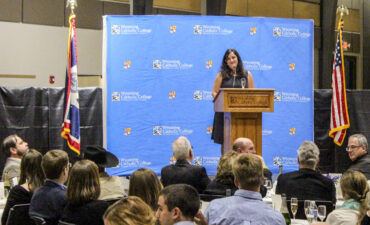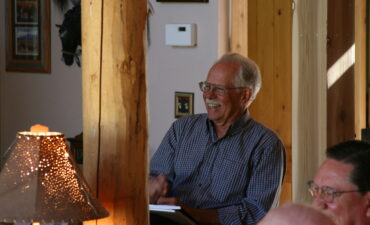“Finding the Center:” A Reflection for These Strange Times from President Glenn Arbery
This past weekend, I got an email from one of last year’s graduates. He said that he missed the Wyoming landscapes that I described in my email column last week, and he also thanked us for making his class memorize W.B. Yeats’s poem, “The Second Coming.” As he put it, “It’s been stuck in my head lately like a song.” That might sound heartwarming at first (a student fondly remembering a poem that moved him), but the reality is a little darker.
Yeats wrote “The Second Coming” almost exactly a century ago in the immediate aftermath of World War I—that enormous refutation of the Enlightenment—when the Spanish influenza raged across the world and new, godless ideologies were rising to power. Developing his own mythology of history, he anticipates the end of the Christian era as part of a complex series of interlocking “gyres” that represent the expansion and contraction of historical civilizations. He imagines a different and ominous “second coming” of an ancient Egyptian civilization, not the return of Christ. Like Nietzsche, Yeats recognizes the devastating consequences of the loss of God at the center of European civilization:
Turning and turning in the widening gyre
The falcon cannot hear the falconer;
Things fall apart; the centre cannot hold;
Mere anarchy is loosed upon the world….
In the poem, the falcon turns in the widening circles of his flight until he “cannot hear the falconer,” the central figure, whereupon “Things fall apart.” Political and cultural Christendom, which once heard Christ in the Church and the Gospels, hears Him no longer—in fact, is no longer “Christendom” at all, as the European Union demonstrates today.
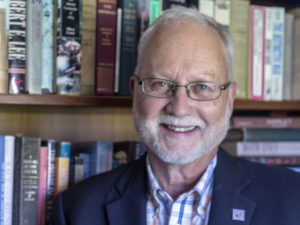
“Things have felt strange lately,” our alumnus wrote, “in the sense that, well, the falcon is spiraling too high and has temporarily lost his connection to earth.” It’s easy to see why this poem sticks in this graduate’s head. Within a few weeks, the world seems to have lost its way. No one knows what will happen with COVID-19—whether it will spread and peak and go away, or whether it will stay around for years, even centuries, as the plague did in Europe. Whether the economy will recover depends on what happens with the virus. The political wrangling that recently occupied everyone’s attention has not stopped, but everyone’s focus now rests on Dr. Anthony Fauci, who is not running for anything. So much has changed. Last night I was crumpling some newspaper to light a fire, and I glanced at the headline from September—the whistleblower, the beginning of what eventually became the impeachment proceedings. It was almost a nostalgic moment: Remember the impeachment?
But another image from the graduate’s letter is still more striking. It comes from Crime and Punishment, which the seniors also read last year. The novel centers on a young student in St. Petersburg who has become convinced of a major difference between ordinary people and a very few who have the right, conferred by their genius, to “step over” the line of law and traditional morality and bring about a greater good for humankind. To prove that he himself is one of those few, Raskolnikov decides to kill a local pawnbroker, a greedy and bitter old woman in his neighborhood; not only will he prove his own capacity to “step over,” but he will take her money and put it to a humanitarian use. He kills the old woman in a truly horrific scene that becomes even more horrific when the old widow’s mentally challenged younger sister, a kind of holy fool, surprises him immediately after the murder. Aghast, Raskolnikov stares at Lizaveta for a long moment and then impulsively splits her skull with the axe. Just here, our graduate finds a disturbing parallel to our current situation: “It reminds me of the silent moment just before Raskolnikov murders Lizaveta, when he notices her mouth twitching like a baby.”
“But I can’t say whether this silence is good or evil,” he goes on. “I can’t make head nor tail of it. It seems like in one sense it’s good: people are reconnecting, people are at least in some sense rediscovering the home and the hearth. But in another sense, this silence seems to have even overcome the Church, just like any other institution. I’m not making claims about what the Church ought to have done or ought to do, but simply stating a fact. What do you think is going on? Should we be preparing for the axe to fall on our heads when the silence is over? If so, how?”
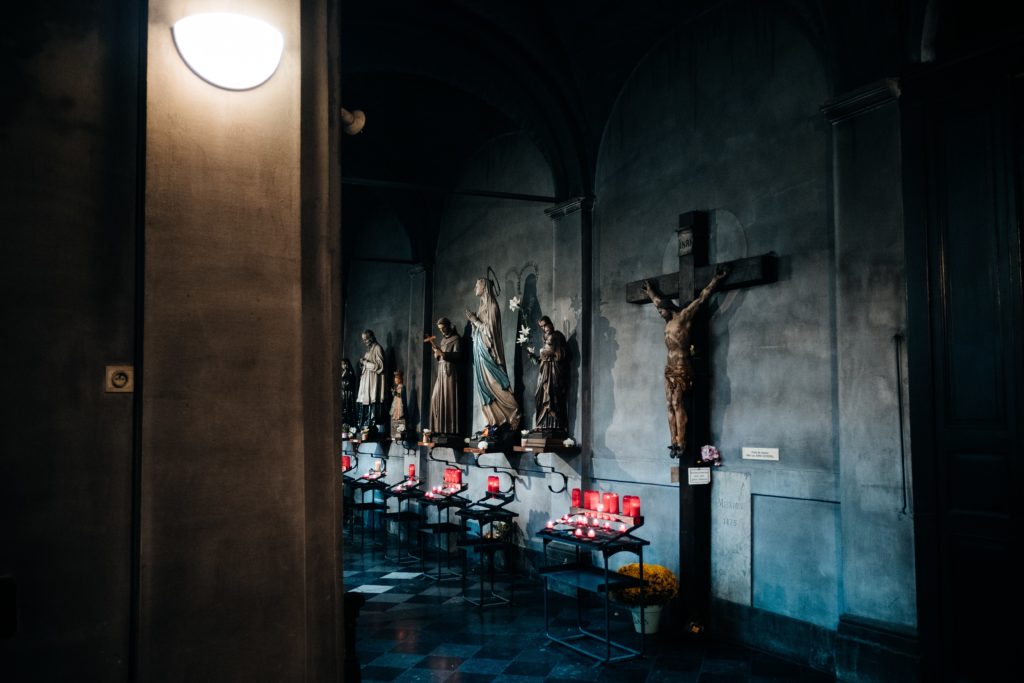
The question about silence seems directed particularly at the Church. Is something worse going to follow, or is this withdrawal of the Word temporary and perhaps wholesome? To ask if the Church is “just like any other institution” seems to be the key concern. If a church is just a place for gatherings where people dangerously expose themselves to the virus, then it makes sense to close the churches. But if it is in fact a sacred institution, founded by Jesus Christ, then what is the logic at work? If we truly believe that COVID-19 is more powerful than Christ in the Eucharist, then the axe has already fallen.
But this is a complicated matter, is it not, especially given the scandals of the past few decades? Some of the priests, bishops, archbishops, and cardinals most deeply entrusted with the sacraments took that trust and abused it heinously. They brought shame and scandal and huge losses, financial and spiritual, upon the Church, and everyone still feels the miasma of a lingering suspicion. In this situation, do churches have Mass as usual and risk incidents like the one with the choir in Seattle? Suspending the sacraments makes churches seem like restaurants or theaters; but suppose that, by not suspending them, the churches spread disease through whole communities of the vulnerable? It would be another great victory for evil, another terrible symbolic inversion of the real work of Christ in the world. Perhaps, in God’s providence, what we need most in the whole context of this moment in salvation history is to see what it really means to be deprived of the sacramental life. Never have I respected priests more in their sacred calling. Never have I taken the Church less for granted.
On the advice of our local pastor from the pulpit, I have been reading straight through the Gospels since before the beginning of Lent. I am now midway through Luke. It is impossible to read the Gospels and not see that Christ’s works as the great healer, His miracles, are inseparable from His teachings. On Bishop Robert Barron’s advice in one of his daily reflections on the daily readings from the Gospel, I have also been working my way through Craig Keener’s massive two-volume study, Miracles, the most comprehensive destruction of the modern argument against miracles (largely stemming from David Hume) that I can imagine. This pandemic brings the “modern project” of medicine, which Descartes emphasized in his Discourse on the Method (1637), into direct conflict with the great healing ministry of the Church.
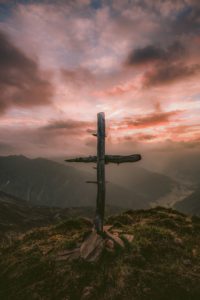 The Church is founded on the Resurrection, and there have been courageous responses to the universal assumption that dying is the worst possible thing. When we had to announce the suspension of classes back on March 14, Dean Kyle Washut quoted passages from C.S. Lewis’s great essay from 1948, “On Living in an Atomic Age,” where Lewis points out that the question is not whether we will die, but how ready we are to do so. First Things editor R.R. Reno stirred up a firestorm of response, most of it angry, when he wrote that we should refuse “death’s dominion” in our response to the COVID-19.
The Church is founded on the Resurrection, and there have been courageous responses to the universal assumption that dying is the worst possible thing. When we had to announce the suspension of classes back on March 14, Dean Kyle Washut quoted passages from C.S. Lewis’s great essay from 1948, “On Living in an Atomic Age,” where Lewis points out that the question is not whether we will die, but how ready we are to do so. First Things editor R.R. Reno stirred up a firestorm of response, most of it angry, when he wrote that we should refuse “death’s dominion” in our response to the COVID-19.
I predict a great resurgence of hope and imagination after this crisis. Who knows whether it is not just for an occasion like this that our College came into existence—to find the unheard-of things preserved for a world that had forgotten them? It’s good to remember how fortunate we have been not to suffer these massive disorientations more frequently; it’s also good to remember that true culture arises out of the joy and beauty we find anyway. Our graduate also asked what books or poems I would recommend. As I said a few weeks ago, the great books of the Western tradition begin with plagues like the one in the opening lines of the Iliad. Look at the history of smallpox, and then read Dickens’ Bleak House, one of the great novels in the English tradition. Reread the epics, especially those that center on a hero who lives for a long time in a condition of uncertainty and fear and who must give up even temporary security in order to accomplish some great task. I think of Aeneas, and there are many others. And Tolkien is not a bad companion when it feels like the shadow of Mordor is coming over the world.
As for poems, it’s a small gesture, but I have started a blog, “A Ragged Patch of Glow,” just to look at a lyric poem a day—insights, glimpses of emotion, intuitions of beauty. I don’t have a program of instruction in mind, just a way to draw on the heights and depths of the capacities of language. I hope that the poems bring a moment or two of clarity.

